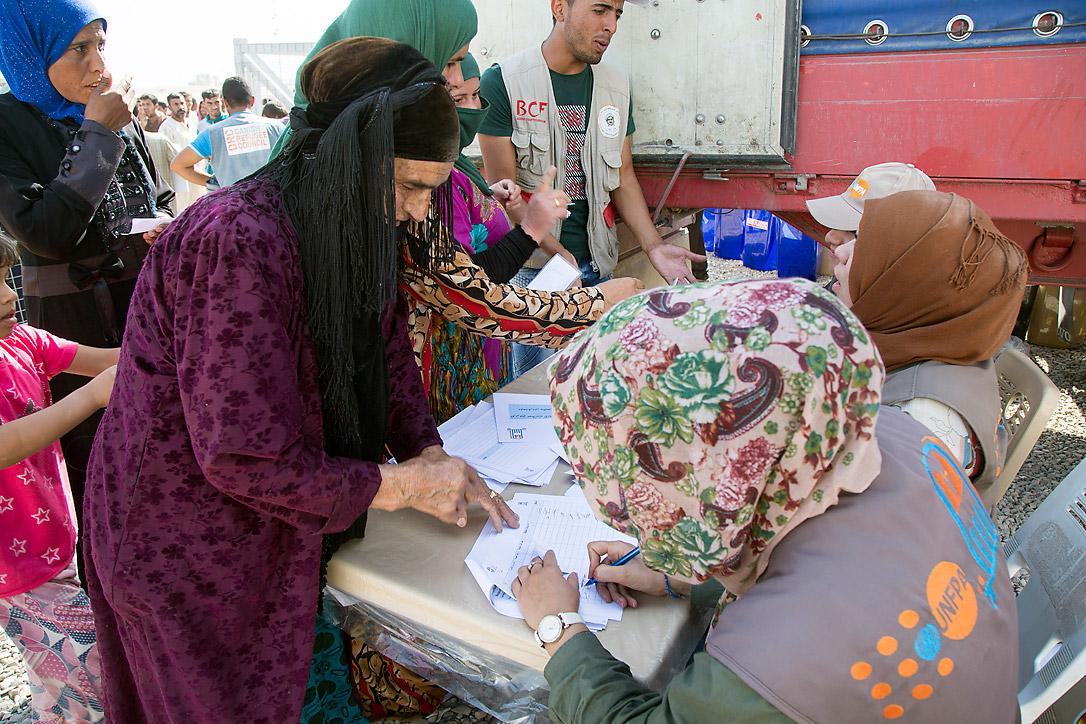Prayer and action on behalf of those seeking refuge

A refugee from Mosul, Iraq, checks her name in order to recieve assistance, at the Dibaga camp, Makhmur, Iraq. Photo: LWF/Seivan M.Salim
ELCA presiding bishop sends pastoral letter
(LWI) The Presiding Bishop of the Evangelical Lutheran Church in America is calling congregations of the ELCA to “learning, prayer and action on behalf of those who seek refuge on our shores.”
ELCA Presiding Bishop Elizabeth Eaton had asked the administration of U.S. President Donald Trump not to stop “the U.S. refugee admissions program or stop resettlement from any country for any period of time.”
“The Bible calls us to welcome the stranger and treat the sojourner as we would our own citizens,” Eaton said, in a pastoral letter on 30 January. “I agree with the importance of keeping our country secure as the administration stated in its executive order last Friday,” Eaton said, “but I am convinced that temporarily banning vulnerable refugees will not enhance our safety nor does it reflect our values as Christians. Instead, it will cause immediate harm by separating families, disrupting lives, and denying safety and hope to brothers and sisters who are already suffering.”
The letter to 9,300 ELCA congregations comes at a time of widespread discussion about and numerous court challenges to President Trump’s attempts to block immigration to the U.S. from several countries.
“Refugees being resettled in the United States have fled persecution because of their race, religion, nationality, political views and/or associations,” Eaton said. “They wait for years for the chance to go home. But sometimes, there is no home for them to go back to.”
I am convinced that temporarily banning vulnerable refugees will not enhance our safety nor does it reflect our values as Christians.
“We know from our partners at Lutheran Immigration and Refugee Service (LIRS) that only one percent of all refugees are chosen for resettlement,” the letter said.
Eaton referred the 3.7 million members of the ELCA to the church’s “Social Message on Immigration,” and the “AMMPARO strategy,” a LIRS program to assist minors fleeing to the United States from countries south of its border. LIRS, a cooperative agency that includes the ELCA, the Lutheran Church-Missouri Synod and the Latvian Evangelical Lutheran Church in America is also involved in education, advocacy and resettlement efforts, Eaton said.
Joy of being welcomed
“People of faith helped start and still sustain the refugee resettlement program in the United States following World War II,” Eaton said in her letter. “As Lutherans, many of our ancestors faced the pain of having to flee their homes and the joy of being welcomed in new communities across the United States. As we have done throughout history, millions of Lutherans across the country honor our shared biblical values, as well as the best of our nation's traditions by offering refuge to those most in need.
“We are committed to continuing ministries of welcome that support and build communities around the country and stand firmly against any policies that result in scaling back the refugee resettlement program,” she said.
The attempt by the U.S. president to bar refugees from certain countries is widely seen as a ban on Muslim refugees.
Eaton said that part of the attempt goes “against our nation’s fundamental values related to freedom of religion,” and said the U.S. “must offer safety to people fleeing religious persecution regardless of their faith tradition.”
“Our faith calls us to welcome the stranger”
Eaton’s declaration echoes concerns expressed by The Lutheran World Federation (LWF), the World Council of Churches (WCC) and ACT Alliance, whose statement on the U.S. Presidential Executive Order said “Our faith calls us and all Christians to love and welcome the stranger, the refugee, the internally displaced person, the other.“
In the U.S., the president’s executive order attempting to stop the influx of refugees has been challenged in the courts and is working its way through a complicated judicial process. But one court ruling halts, temporarily, the absolute ban on refugee resettlement from the countries named in the executive order. More court decisions are expected, although the matter may need to go to the U.S. Supreme Court.





